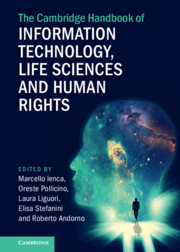Book contents
- The Cambridge Handbook of Information Technology, Life Sciences and Human Rights
- The Cambridge Handbook of Information Technology, Life Sciences and Human Rights
- Copyright page
- Contents
- Tables
- Contributors
- Acknowledgements
- Introduction
- Part I Life Sciences and Human Rights
- Part II Information and Communication Technologies and Human Rights
- 10 The Right to Internet Access
- 11 Face Recognition and the Right to Stay Anonymous
- 12 Artificial Intelligence and the Right to Algorithmic Transparency
- 13 Machine Learning, Cognitive Sovereignty and Data Protection Rights with Respect to Automated Decisions
- 14 Going Dark or Living Forever
- 15 Artificial Intelligence and Children’s Rights
- 16 Internet of Things Devices, Citizen Science Research and the Right to Science
- 17 Connected but Still Excluded?
- Part III Towards a Convergence
16 - Internet of Things Devices, Citizen Science Research and the Right to Science
Ethical and Legal Issues
from Part II - Information and Communication Technologies and Human Rights
Published online by Cambridge University Press: 17 May 2022
- The Cambridge Handbook of Information Technology, Life Sciences and Human Rights
- The Cambridge Handbook of Information Technology, Life Sciences and Human Rights
- Copyright page
- Contents
- Tables
- Contributors
- Acknowledgements
- Introduction
- Part I Life Sciences and Human Rights
- Part II Information and Communication Technologies and Human Rights
- 10 The Right to Internet Access
- 11 Face Recognition and the Right to Stay Anonymous
- 12 Artificial Intelligence and the Right to Algorithmic Transparency
- 13 Machine Learning, Cognitive Sovereignty and Data Protection Rights with Respect to Automated Decisions
- 14 Going Dark or Living Forever
- 15 Artificial Intelligence and Children’s Rights
- 16 Internet of Things Devices, Citizen Science Research and the Right to Science
- 17 Connected but Still Excluded?
- Part III Towards a Convergence
Summary
Although lay participation has long been a feature of scientific research, the past decades have seen an explosion in the number of citizen science projects. Simultaneously, the number of low-cost network connected devices collectively known as Internet of Things devices has proliferated. The increased use of Internet of Things devices in citizen science exists has coincided with a reconsideration of the right to science under international law. Specifically, the Universal Declaration of Human Rights and the International Covenant on Economic Social and Cultural Rights both recognise a right to benefit and participate in the scientific process. Whilst it is unclear whether this right protects participation by citizen scientists, it provides a useful framework to help chart the ethical issues raised by citizen science. In this chapter, we first describe the origins and boundaries of the right to science, as well as its relevance to citizen science. We then use the findings of a scoping review to examine three main ethical and legal issues for using Internet of Things devices in citizen science.
Keywords
Information
- Type
- Chapter
- Information
- Publisher: Cambridge University PressPrint publication year: 2022
